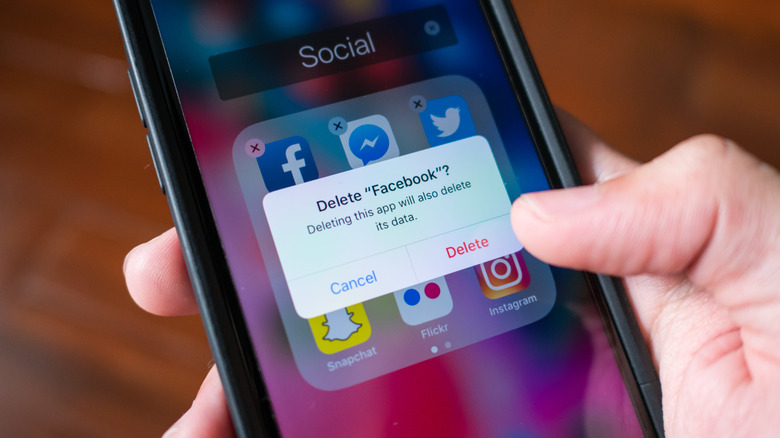Here's What Happens To Your Brain When You Quit Social Media
The presence of social media in our day-to-day lives can feel like both a blessing and a curse. On the one hand, it fosters a sense of connection, enhances communication, and provides a platform for creatives, educators, and small business owners alike. Yet on the other hand, it can prompt feelings of insecurity, political divisiveness, and enable online bullying (via Lifespan).
According to Statista, social media use in the United States has grown exponentially over the years. Compared to a mere 10% of the population reporting social media usage in 2008, a whopping 82% of the population now reports having at least one social networking profile as of 2021.
Most concerns over social media usage pertain to its effects on our mental health. A 2013 study found that the more time young people spent scrolling through Facebook, the more likely they were to report feelings of diminished "moment-to-moment happiness" (via Forbes). Science demonstrates that some of these mental health concerns may be linked to structural changes that take place in the brain due to social media use (via NeuroGrow). So on the flip side, what happens to our brain when we quit social media and how does doing so influence our mental health?
Quitting social media can reduce stress hormone production in the brain
Quitting social media has been found to offer health benefits. Some people, however, may first feel worse before they feel better. Experts at The Healthy describe the initial stress or anxiety that accompanies a social media cleanse as "neurological withdrawal." Founder of the Center for Internet and Technology Addiction David Greenfield explains that "If you're using social media addictively, which some people are, you have elevated levels of dopamine, so when you stop doing that, there is some withdrawal."
However, the long-term effects of quitting social media may very well outweigh the initial discomfort of doing so. According to The Healthy, the need to be constantly connected can boost the production of stress hormones in the brain, which can negatively affect memory and increase the risk of depression. Abandoning social media lessens this risk, thereby enabling more feelings of focus and calm.
Quitting social media may boost sleep and academic performance
For a brain to function as it should, it requires adequate sleep. A 2018 study discovered that social media engagement caused users to get fewer hours of sleep per night and that they were more prone to sleep interruptions (via McLean Hospital). Lack of sleep can impact cognitive function during the daytime in numerous ways, including decreases in academic performance.
Conversely, a 2019 study found that quitting social media can have the opposite effect on our grades. The research was conducted on college students studying subjects related to science or business. On average, these students spent two hours per day using Facebook. It turned out that students who spent 3 hours a day on Facebook — just one hour more above average — demonstrated a 10% decrease in exam marks. Researchers determined that students with below-average grades could benefit from quitting social media due to the positive effects it offers such as increasing focus and freeing up study time.



